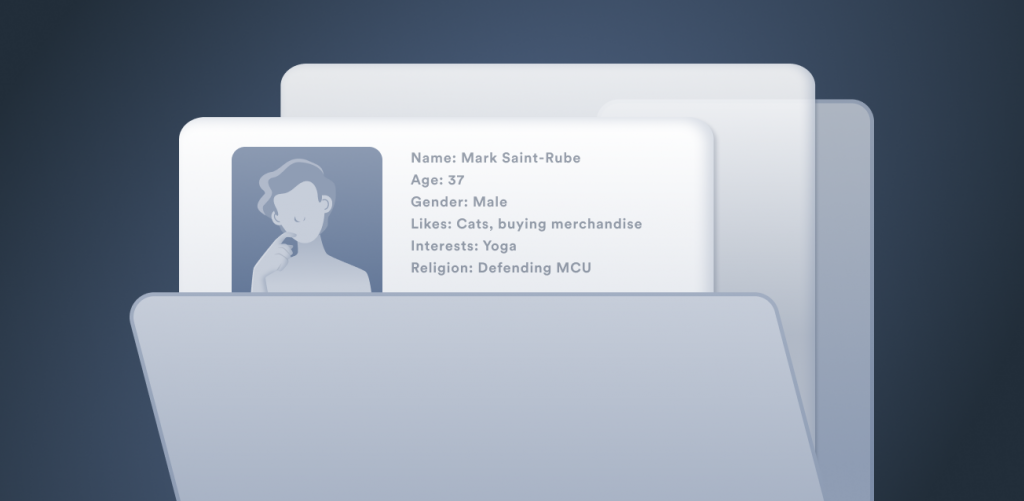Not all prefer to keep track of their periods on a wall calendar. That’s why menstrual cycle trackers are so popular, period. But are they tracking more than menstrual cycles?
Table of contents
Which period tracker apps track you the most?
To find out, we created a measurement system and looked at the 20 most popular period trackers in the US. Each app’s score is based on the quantity and sensitivity of the collected data. Here’s how the point system looks:
- 1 point: data that’s not linked to a user’s identity (such as app crash data);
- 2 points: data that could be linked to a user’s identity (such as name);
- 3 points: data that could track users across apps and websites (such as user ID).
Note: we elaborate more on the ranking system and research in the Methodology section at the end of the article.
Here are the results (remember: high score = bad)
Eve, Glow, and Ovia are the most data-hungry period-tracking apps
Among the top 20 thirsty for blood-data apps and the amount of data points they collect in each category, Eve, Glow, and Ovia take the top 3.
Eve (67.2 points)
The app really bites off a chunk of the Forbidden fruit as it collects 18 of the 32 possible data points. 7 of them allow the app to track users across platforms: name, email address, product interaction, coarse location*, device ID, purchase history, and advertising data. The last 4 data points are also used for third-party advertising.
*Coarse location is determined using Wi-Fi and mobile data — the place is roughly pinpointed to a city block, ergo, the coarse bit.
Glow (64.8 points)
Eve and Glow come from the same developer, so it’s no surprise their data collection practices are very similar. Glow collects just one less data point than Eve — 17 of the 32 possible.
The only difference is that Glow doesn’t collect the user’s phone number (Eve does, but this data point isn’t used for tracking, even if it’s linked to the user). With Eve, 4 out of 7 data points that allow the app to track users across platforms are used for third-party advertising. Not much of a glow-up!
Ovia (62.4 points)
Ovia collects 19 out of the 32 possible data points. This is more than the first two apps. However, its data-hungriness index is lower since less data is used for tracking (5 data points as opposed to 7). The 5 data points used to track your coarse location, device ID, product interaction, advertising data, and performance data.
On the downside, Ovia collects a lot more data for third-party advertising — name, coarse location, health, email address, user ID, device ID, other financial info, product interaction, advertising data, sensitive info, and performance data (11 in total). This is ovia-sly annoying.
How private are Clue and Flo apps?
Clue and Flo are probably the two most-known period tracking apps. However, they both collect more data points than the average (11), suggesting that they are not the most private femtech choices out there.
Both collect similar data points: Flo takes 15, and Clue gets 13. But when expecting the visit from Aunt Flo, the app is much nosier as Flo’s index is significantly (1.7 times) larger than Clue’s. That’s because it collects more data points used to track you — 5 as opposed to 1.
Flo also collects more data points linked to your flow (15 as opposed to 10). Both apps collect contact info — name and email address — and use this data to track you.
On the plus side, neither app is trying to sell you carbon nanotube period panties that don’t work as they don’t use third-party advertising. However, a 2019 report from The Wall Street Journal revealed that Flo secretly shared sensitive user data with Facebook. The company settled the charges in 2021.
Dangers of tech companies collecting data
Do you really want your phone to know more about your cycle than you? Recent journalist investigations suggest that your phone could reveal if you’ve had an abortion, as “internet searches, visits to clinics, and period-tracking apps leave digital trails.” If you want to keep that information to yourself, keep it away from track-happy apps.
Third-party advertising is another consequence arising from tech companies collecting your data. You don’t need to have an instinctive hatred of ads to realize that period-tracking apps might not be the best choice for your privacy. They’re based in the US and rank high on the data-hungriness index.
First off, the US government is known to request user data from tech companies. From 2013 to 2020, it was 5th by requests per 100k people and 1st in overall requests. During this period, the US government made at least 23,972 user data requests from Apple, according to the government surveillance report. That’s 56% of the total requests the tech giant had received. Percentage of fully or partially disclosed user data requests (accumulated yearly US average)? 51%.
A large part of the examined apps is based in the US. So it’s worth having the 2018 US CLOUD act in mind when choosing your period tracker.
The act states that companies subject to US jurisdiction must disclose data (e.g., user data) for legal purposes, regardless of where the company stores the data. This means that officials can possibly get access to information such as ethnicity, menstrual cycle info, weight, and even information about sexual activities.
Period-tracking apps that use your data for third-party advertising
Third-party advertising means all those annoying ads you see on your app and the possible sharing of your personal data with companies that provide those ads. Nearly half (9) of all the examined apps use users’ data for third-party advertising:
Ovia, Eve, Glow, Period Tracker by GP Apps, Clover, Period Calendar Period Tracker, My Calendar – Period Tracker, Spot On, and Teen Period Tracker (MagicGirl).
All but one are based in the US, and the list also features three of the most data-hungry apps.
Unfortunately, Spot On, an app provided by Planned Parenthood, makes the list. Using it means that data such as user ID and email address is linked to you. The sliver of silver lining here is that neither data is used to track you.
MagicGirl, a period-tracking app marketed for teen girls, also uses your data for third-party advertising. And although that data is not directly linked to users, teens probably don’t need more targeted advertising aimed at them.
Should you care about your data being shared with third-party advertising entities?
Past cases have proven that purveyors of targeted ads may know extensive information about your life, including when you’re pregnant.
Famously, Target once sent coupons for baby clothes and cribs to a teenage girl way before her father found out she was pregnant. There was also a debate about whether Amazon has a pregnancy-prediction mechanism in place after an email with a baby gift was accidentally sent to a large portion of customers.
A deep-dive into period-tracking app data collection practices
So, what data are period trackers most interested in? The most collected information is product interaction data, health data, and sensitive info (17 apps do this). That last category includes anything from race and religion to sexual orientation and pregnancy information.
While 75% of the examined apps collect contact info (name, email address, and/or phone number), the rest don’t. On the other hand, all these apps collect Device ID, which is unique to every device and could be traced back to the cell phone owner.
Out of the 32 possible data points, there are 7 that none of the apps collect. Most notably — precise location, browsing history, and payment and credit info.
While none of the apps collect your exact location, half of them collect your coarse location. This information can be used for different reasons.
For example, as per Clue’s Privacy Policy, approximate location is used for “statistical, analytics purposes, and regulatory compliance in different countries.” While coarse data might be used to pinpoint your address, they would only be able to narrow your location down to state.
8 apps additionally collect users’ photo and video library data. As per Glow’s Privacy Policy, this includes “user-generated content that you upload, generate, transmit, or otherwise make available on the service, such as profile pictures, photos, videos, images.”
We should note that, when it comes to data hygiene, it’s not a good idea to grant data collection permissions that are not necessary for the app to work.
While the average of the collected data points is 11, half of the apps collect more — so it’s not just some freaky outlier skewing the curve. Additionally, all the apps that collect an above-average amount of data points use tracking, except for Cycles and Bellabeat. And you thought the apps only knew your (or your partner’s) menstrual cycle.
What is the most private period tracking app?
The two most (Eve and Glow) and the least (Life and Apple’s Cycle Tracking) data-hungry period tracking apps are based in the US. But while Eve and Glow collect plenty of data that can be used to track you, Life and Apple’s Cycle Tracking don’t. So even if they’re in the US, there are privacy-oriented period trackers that don’t share data with third-party advertisers
Both have low indices of 4 — none of the 4 data points they collect are linked to or used to track the user. No data is used for third-party advertising either.
It’s worth noting that Apple’s Cycle Tracking Privacy Policy was taken from its standalone app for Apple Watch. Cycle Tracking on other Apple devices is accessed through the Apple Health app. It collects 6 more data points, but neither is linked to you or used to track you, and they’re not used for third-party advertising either.
You deserve your privacy. Period.
Periods are a near-unavoidable fact of a female-bodied person’s life. It’s good that there are technical solutions to help with the pains of tracking them. However, such apps’ utility doesn’t mean they should know more about you than your gynecologist.
We hope our research will help you make an informed decision about your time-of-the-month app.
Methodology
We compared data collected by 20 period tracking apps based on the 32 types of data listed by the Apple App Store. Apps from the Google Play Store might have different privacy settings.
The index was calculated by assigning the value from 1-3 to each data point by how much it could potentially expose the user:
- 1 point: “Data Not Linked to a user” — data that isn’t linked to a user’s identity (such as app crash data);
- 2 points: “Data Linked to a user” — data that may be linked to a user’s identity (such as name);
- 3 points: “Data Used to Track users” — data that may be used to track users across apps and websites owned by other companies (such as User ID).
An additional 20% of the sum points were added if the company uses the collected data for “Third-Party advertising.” Apps were ranked by the index value in descending order.
According to Apple guidelines for developers, using data for third-party advertising means: “Such as displaying third-party ads in your app or sharing data with entities which display third-party ads.”
Apps were selected based on US Apple App Store rankings using the AppMagic tool as a reference and medically reviewed lists from Healthline and MedicalNewsToday.
Feel free to visit our period tracker apps document for the full research material behind this study.
Sources:
What data can the government get from tech companies
How Target Figured Out A Teen Girl Was Pregnant Before Her Father Did
Has Amazon gotten so big it knows you’re pregnant before you do?
All data used in the study was accessed or collected on May 13th, 2022.
FAQ
Are period tracking apps safe?
Not really. The safest option is apps that don’t use third-party tracking, which by default means your data isn’t sold to others.
It’s a question of which you value more — convenience or privacy.
If you’re concerned about your privacy, it’s better not to use such apps — anything you type in is usually sent to the provider’s servers, which means they know when the lower belly pains begin.
If you see ads on your app, the provider is likely selling your data to third-party advertisers. Most free apps do that — that’s how they make money.
Should I delete my period tracking app?
Yes, you should delete your period tracker if you’re worried about privacy. Or at least use one that isn’t as data-hungry. And if you do decide to use a period tracker, consider not putting private details in it. More so, if you’re in a place that deems it a criminal offense to take care of your body (at least some forms of it).


